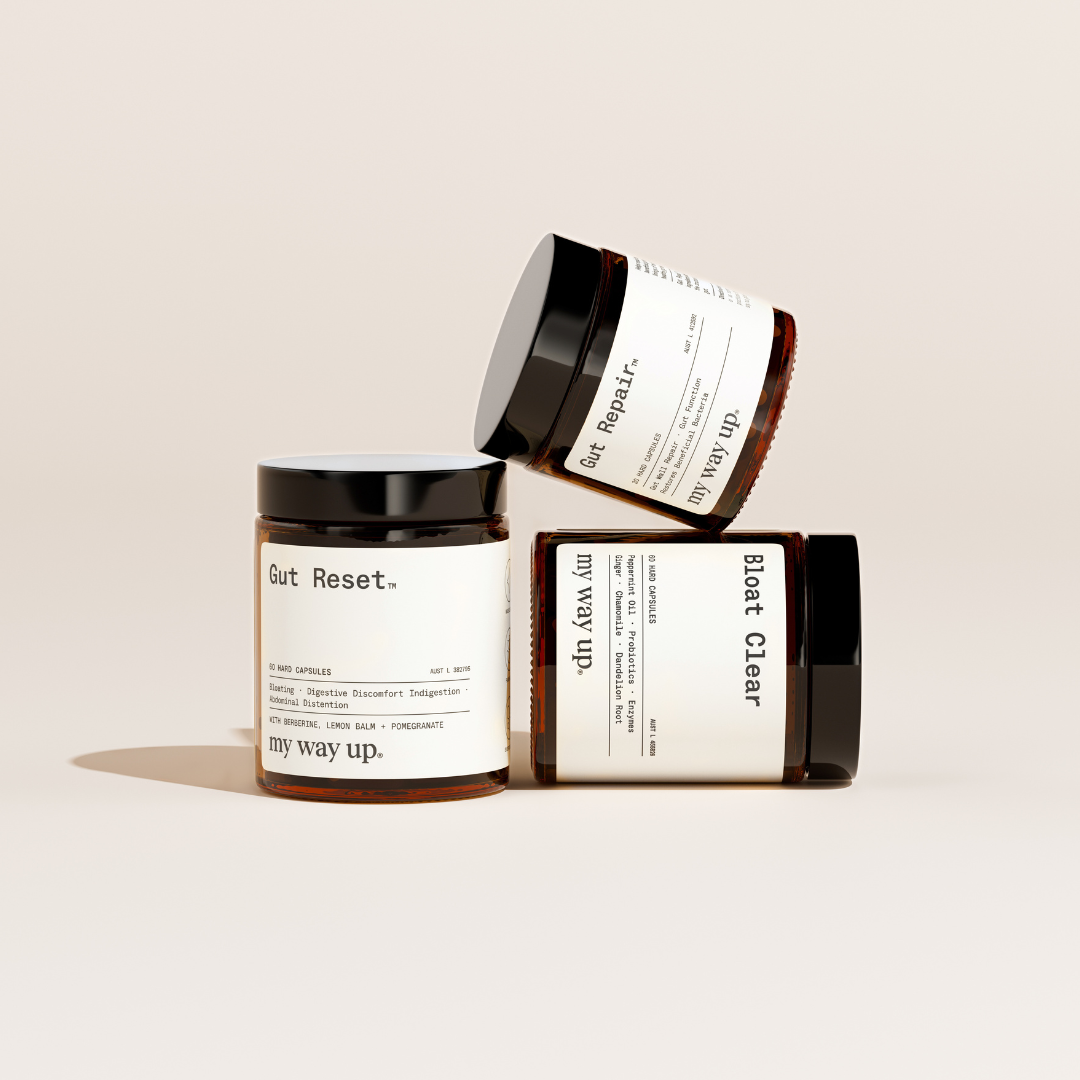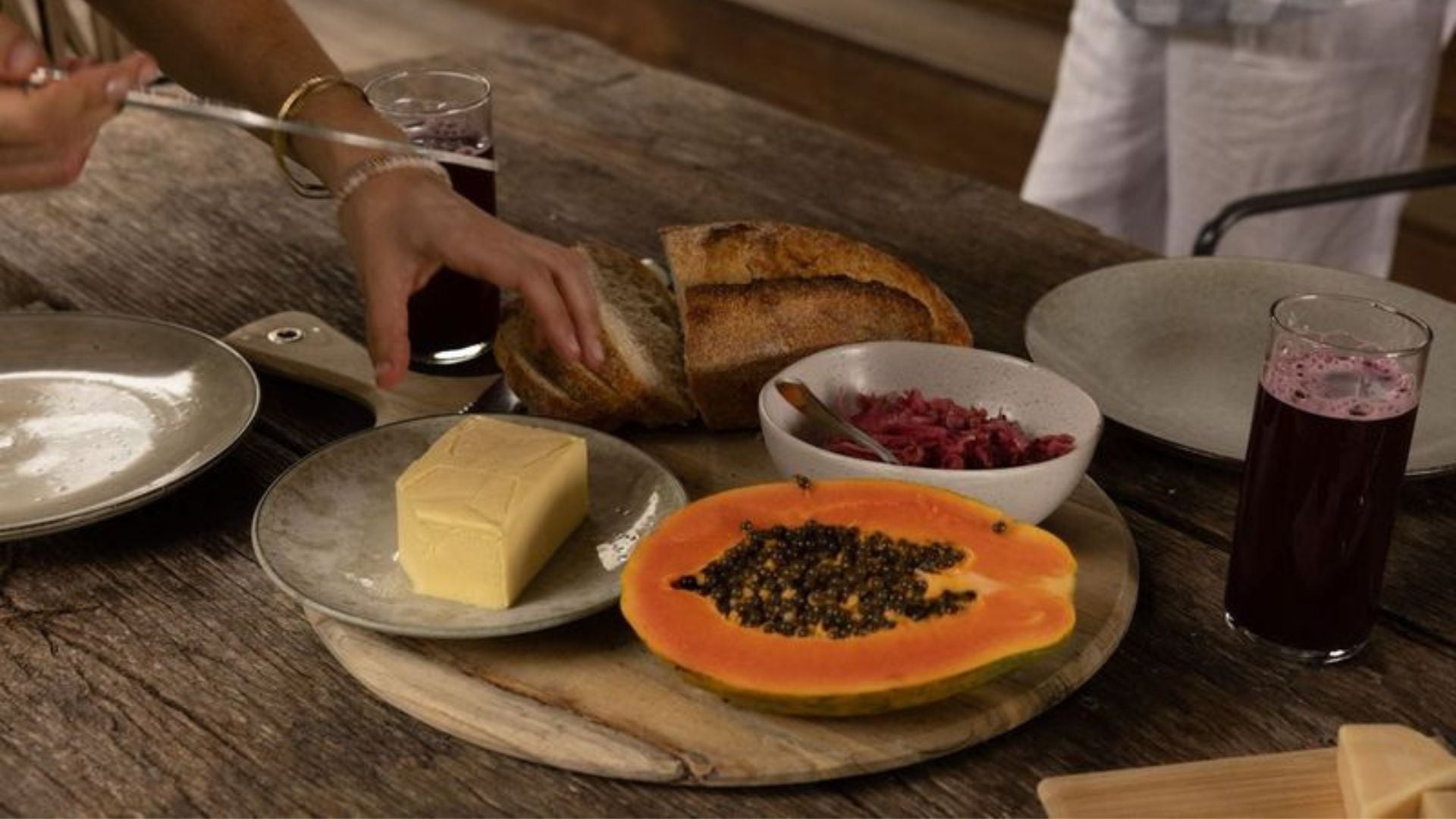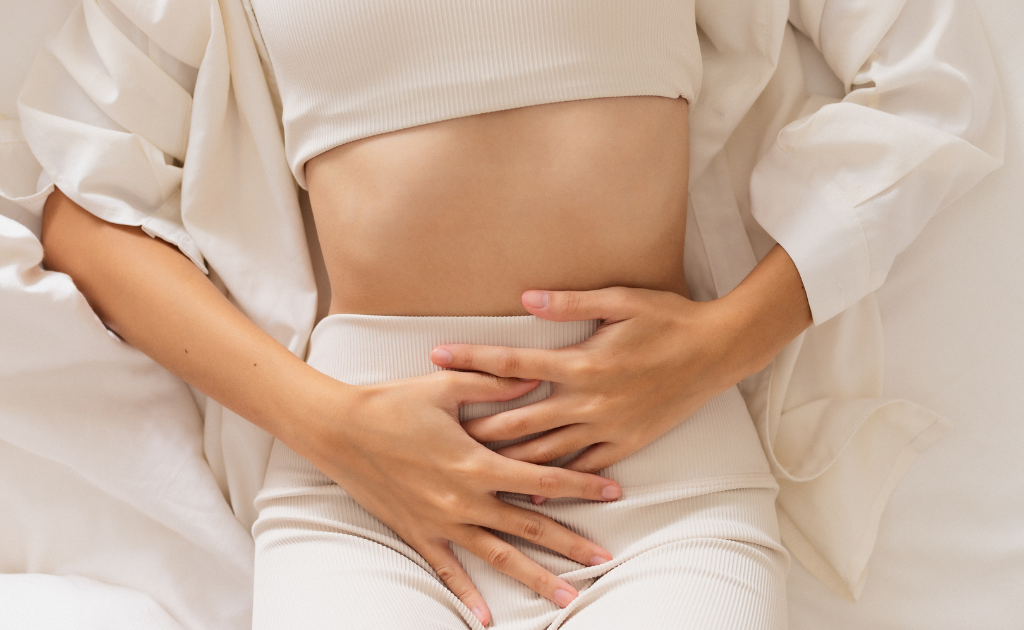1.
Bennet SMP, Ohman L, Simren M. Gut microbiota as potential orchestrators of irritable bowel syndrome. Gut Liver 2015;9:318–31. https://doi.org/10.5009/gnl14344.
2.
Santana PT, Rosas SLB, Ribeiro BE, Marinho Y, de Souza HSP. Dysbiosis in Inflammatory Bowel Disease: Pathogenic Role and Potential Therapeutic Targets. Int J Mol Sci 2022;23:3464. https://doi.org/10.3390/ijms23073464.
3.
Baldelli V, Scaldaferri F, Putignani L, Del Chierico F. The Role of Enterobacteriaceae in Gut Microbiota Dysbiosis in Inflammatory Bowel Diseases. Microorganisms 2021;9:697. https://doi.org/10.3390/microorganisms9040697.
4.
Takakura W, Pimentel M. Small Intestinal Bacterial Overgrowth and Irritable Bowel Syndrome – An Update. Front Psychiatry 2020;11. https://doi.org/10.3389/fpsyt.2020.00664.
5.
Böhn L, Störsrud S, Törnblom H, Bengtsson U, Simrén M. Self-Reported Food-Related Gastrointestinal Symptoms in IBS Are Common and Associated With More Severe Symptoms and Reduced Quality of Life. Off J Am Coll Gastroenterol ACG 2013;108:634. https://doi.org/10.1038/ajg.2013.105.
6.
Singh P, Tuck C, Gibson PR, Chey WD. The Role of Food in the Treatment of Bowel Disorders: Focus on Irritable Bowel Syndrome and Functional Constipation. Off J Am Coll Gastroenterol ACG 2022;117:947. https://doi.org/10.14309/ajg.0000000000001767.
7.
Scarlata AP Kate. Diets for irritable bowel syndrome: what you need to know. Gut Microbiota Health 2023. https://www.gutmicrobiotaforhealth.com/diets-for-irritable-bowel-syndrome-what-you-need-to-know/ (accessed March 17, 2025).
8.
Shaikh SD, Sun N, Canakis A, Park WY, Weber HC. Irritable Bowel Syndrome and the Gut Microbiome: A Comprehensive Review. J Clin Med 2023;12:2558. https://doi.org/10.3390/jcm12072558.
9.
Min YW, Rezaie A, Pimentel M. Bile Acid and Gut Microbiota in Irritable Bowel Syndrome. J Neurogastroenterol Motil 2022;28:549–61. https://doi.org/10.5056/jnm22129.
10.
Dean BB, Aguilar D, Barghout V, Kahler KH, Frech F, Groves D, et al. Impairment in work productivity and health-related quality of life in patients with IBS. Am J Manag Care 2005;11:S17-26.
11.
Lei Y, Sun X, Ruan T, Lu W, Deng B, Zhou R, et al. Effects of Probiotics and Diet Management in Patients With Irritable Bowel Syndrome: A Systematic Review and Network Meta-analysis. Nutr Rev 2025:nuae217. https://doi.org/10.1093/nutrit/nuae217.
12.
Dean G, Chey SW, Singh P, Chey WD. A diet low in fermentable oligo-, di-, monosaccharides and polyols improves abdominal and overall symptoms in persons with all subtypes of irritable bowel syndrome. Neurogastroenterol Motil 2024;36:e14845. https://doi.org/10.1111/nmo.14845.
13.
GMFH Editing Team. Diet and probiotics for managing carbohydrate intolerance. Gut Microbiota Health 2025. https://www.gutmicrobiotaforhealth.com/diet-and-probiotics-for-managing-carbohydrate-intolerance/ (accessed March 17, 2025).
14.
Hookway C, Buckner S, Crosland P, Longson D. Irritable bowel syndrome in adults in primary care: summary of updated NICE guidance. BMJ 2015;350:h701. https://doi.org/10.1136/bmj.h701.
15.
McKenzie YA, Bowyer RK, Leach H, Gulia P, Horobin J, O’Sullivan NA, et al. British Dietetic Association systematic review and evidence-based practice guidelines for the dietary management of irritable bowel syndrome in adults (2016 update). J Hum Nutr Diet Off J Br Diet Assoc 2016;29:549–75. https://doi.org/10.1111/jhn.12385.
16.
McRorie JWJ, Fahey GCJ, Gibb RD, Chey WD. Laxative effects of wheat bran and psyllium: Resolving enduring misconceptions about fiber in treatment guidelines for chronic idiopathic constipation. J Am Assoc Nurse Pract 2020;32:15. https://doi.org/10.1097/JXX.0000000000000346.
17.
Jalanka J, Major G, Murray K, Singh G, Nowak A, Kurtz C, et al. The Effect of Psyllium Husk on Intestinal Microbiota in Constipated Patients and Healthy Controls. Int J Mol Sci 2019;20:433. https://doi.org/10.3390/ijms20020433.
18.
Pasta A, Formisano E, Calabrese F, Plaz Torres MC, Bodini G, Marabotto E, et al. Food Intolerances, Food Allergies and IBS: Lights and Shadows. Nutrients 2024;16:265. https://doi.org/10.3390/nu16020265.
19.
Zhang J, Yu P, Xu Y, Lu XY, Xu Y, Hang J, et al. Efficacy and Safety of a Low-FODMAP Diet in Combination with a Gluten-Free Diet for Adult Irritable Bowel Syndrome: A Systematic Review and Meta-Analysis. Dig Dis Sci 2024;69:4124–32. https://doi.org/10.1007/s10620-024-08671-8.
20.
Liu Y, Jin D, He T, Liao X, Shao L, Shi L, et al. Effect of the combined intervention of low-FODMAPs diet and probiotics on IBS symptoms in Western China: A randomized controlled trial. Food Sci Nutr 2024;12:3993–4004. https://doi.org/10.1002/fsn3.4057.
21.
Elnawasany S. Boswellia Carries Hope for Patients with Inflammatory Bowel Disease (IBD). Med. Plants - Chem. Biochem. Pharmacol. Approaches, IntechOpen; 2023. https://doi.org/10.5772/intechopen.112244.
22.
Belcaro G, Gizzi G, Pellegrini L, Corsi M, Dugall M, Cacchio M, et al. Supplementation with a lecithin-based delivery form of Boswellia serrata extract (Casperome®) controls symptoms of mild irritable bowel syndrome. Eur Rev Med Pharmacol Sci 2017;21:2249–54.
23.
Giacosa A, Riva A, Petrangolini G, Allegrini P, Fazia T, Bernardinelli L, et al. Positive Effects of a Lecithin-Based Delivery Form of Boswellia serrata Extract in Acute Diarrhea of Adult Subjects. Nutrients 2022;14:1858. https://doi.org/10.3390/nu14091858.
24.
Hewlings S, Kalman D. A Review of Zinc-L-Carnosine and Its Positive Effects on Oral Mucositis, Taste Disorders, and Gastrointestinal Disorders. Nutrients 2020;12:665. https://doi.org/10.3390/nu12030665.
25.
Li M, Sun Z, Zhang H, Liu Z. Recent advances on polaprezinc for medical use (Review). Exp Ther Med 2021;22:1–7. https://doi.org/10.3892/etm.2021.10880.
26.
Moonsamy G, Roets-Dlamini Y, Langa CN, Ramchuran SO. Advances in Yeast Probiotic Production and Formulation for Preventative Health. Microorganisms 2024;12:2233. https://doi.org/10.3390/microorganisms12112233.
27.
Lapina T, Khrabrova AA, Nurgalieva BK. Probiotics in gastroenterological diseases: Saccharomyces boulardii CNCM I-745 under the spotlight. RMJ 2024:26–30. https://doi.org/10.32364/2225-2282-2024-11-5.
28.
Colombo E, Sangiovanni E, Dell′Agli M. A Review on the Anti-Inflammatory Activity of Pomegranate in the Gastrointestinal Tract. Evid Based Complement Alternat Med 2013;2013:247145. https://doi.org/10.1155/2013/247145.
29.
Sivamani RK, Chakkalakal M, Pan A, Nadora D, Min M, Dumont A, et al. Prospective Randomized, Double-Blind, Placebo-Controlled Study of a Standardized Oral Pomegranate Extract on the Gut Microbiome and Short-Chain Fatty Acids. Foods 2024;13:15. https://doi.org/10.3390/foods13010015.
30.
Zhang Y, Huang S, Zhang S, Hao Z, Shen J. Pomegranate Peel Extract Mitigates Diarrhea-Predominant Irritable Bowel Syndromes via MAPK and NF-κB Pathway Modulation in Rats. Nutrients 2024;16:3854. https://doi.org/10.3390/nu16223854.
31.
Wade U, Pascual-Figal DA, Rabbani F, Ernst M, Albert A, Janssens I, et al. The Possible Synergistic Pharmacological Effect of an Oral Berberine (BBR) and Curcumin (CUR) Complementary Therapy Alleviates Symptoms of Irritable Bowel Syndrome (IBS): Results from a Real-Life, Routine Clinical Practice Settings-Based Study. Nutrients 2024;16:1204. https://doi.org/10.3390/nu16081204.
32.
Dehau T, Cherlet M, Croubels S, Van De Vliet M, Goossens E, Van Immerseel F. Berberine-microbiota interplay: orchestrating gut health through modulation of the gut microbiota and metabolic transformation into bioactive metabolites. Front Pharmacol 2023;14. https://doi.org/10.3389/fphar.2023.1281090.
33.
Zhang J, Liu J, Zhu S, Fang Y, Wang B, Jia Q, et al. Berberine alleviates visceral hypersensitivity in rats by altering gut microbiome and suppressing spinal microglial activation. Acta Pharmacol Sin 2021;42:1821–33. https://doi.org/10.1038/s41401-020-00601-4.
34.
Petrisor G, Motelica L, Craciun LN, Oprea OC, Ficai D, Ficai A. Melissa officinalis: Composition, Pharmacological Effects and Derived Release Systems—A Review. Int J Mol Sci 2022;23:3591. https://doi.org/10.3390/ijms23073591.
35.
Juee LYM, Sofi SH, Adham AN. Melissa officinalis gastroprotective and antioxidant efficacy. J Funct Foods 2023;105:105550. https://doi.org/10.1016/j.jff.2023.105550.
36.
Shakeri A, Sahebkar A, Javadi B.Melissa officinalisL. – A review of its traditional uses, phytochemistry and pharmacology. J Ethnopharmacol 2016;188:204–28. https://doi.org/10.1016/j.jep.2016.05.010.
37.
Gopalsamy RG, Antony PJ, Athesh K, Hillary VE, Montalvão MM, Hariharan G, et al. Dietary essential oil components: A systematic review of preclinical studies on the management of gastrointestinal diseases. Phytomedicine 2025;140:156630. https://doi.org/10.1016/j.phymed.2025.156630.
38.
Heghes SC, Vostinaru O, Rus LM, Mogosan C, Iuga CA, Filip L. Antispasmodic Effect of Essential Oils and Their Constituents: A Review. Molecules 2019;24:1675. https://doi.org/10.3390/molecules24091675.
39.
Kim Y-G, Lee J-H, Gwon G, Kim S-I, Park JG, Lee J. Essential Oils and Eugenols Inhibit Biofilm Formation and the Virulence of Escherichia coli O157:H7. Sci Rep 2016;6:36377. https://doi.org/10.1038/srep36377.
40.
Vassiliou E, Awoleye O, Davis A, Mishra S. Anti-Inflammatory and Antimicrobial Properties of Thyme Oil and Its Main Constituents. Int J Mol Sci 2023;24:6936. https://doi.org/10.3390/ijms24086936.
41.
Ullah H, Di Minno A, Piccinocchi R, Buccato DG, De Lellis LF, Baldi A, et al. Efficacy of digestive enzyme supplementation in functional dyspepsia: A monocentric, randomized, double-blind, placebo-controlled, clinical trial. Biomed Pharmacother 2023;169:115858. https://doi.org/10.1016/j.biopha.2023.115858.
42.
Martin-Biggers J. A Multi-Digestive Enzyme and Herbal Dietary Supplement Reduces Bloating in a Single Use in Healthy Adults: A Randomized, Placebo-Controlled, Cross Over Study. Nutr Diet Suppl 2024;16:51–7. https://doi.org/10.2147/NDS.S453377.
43.
Spagnuolo R, Cosco C, Mancina RM, Ruggiero G, Garieri P, Cosco V, et al. Beta-glucan, inositol and digestive enzymes improve quality of life of patients with inflammatory bowel disease and irritable bowel syndrome. Eur Rev Med Pharmacol Sci 2017;21:102–7.
44.
Pham VT, Steinert RE, Duysburgh C, Ghyselinck J, Marzorati M, Dekker PJT. In Vitro Effect of Enzymes and Human Milk Oligosaccharides on FODMAP Digestion and Fecal Microbiota Composition. Nutrients 2023;15:1637. https://doi.org/10.3390/nu15071637.
45.
Madempudi RS, Neelamraju J, Ahire JJ, Gupta SK, Shukla VK. Bacillus coagulans Unique IS2 in Constipation: A Double-Blind, Placebo-Controlled Study. Probiotics Antimicrob Proteins 2020;12:335–42. https://doi.org/10.1007/s12602-019-09542-9.
46.
Unique IS2. Unique IS2 n.d. https://uniqueis2.com/ (accessed March 23, 2025).
47.
Digestive Health. Unique IS2 2023. https://uniqueis2.com/digestive-health/ (accessed March 23, 2025).
48.
Sarkar M, Chawla P. Curative Properties of Chamomile in Gastrointestinal Disorders. Herbs Spices Med. Plants Hum. Gastrointest. Disord., Apple Academic Press; 2022.
49.
McKay DL, Blumberg JB. A Review of the bioactivity and potential health benefits of chamomile tea (Matricaria recutita L.). Phytother Res 2006;20:519–30. https://doi.org/10.1002/ptr.1900.
50.
Agah S, Taleb AM, Moeini R, Gorji N, Nikbakht H, Soltani M. Chamomile efficacy in patients of the irritable bowel syndrome. Pharma Chem 2015;7:41–5.










![[CHEAT SHEET] 5 secret hacks to fix your bloating](http://mywayup.com/cdn/shop/articles/Blog_Post_Images_1024_x_630_px_-3.png?v=1749536934)